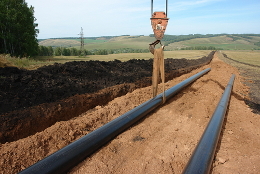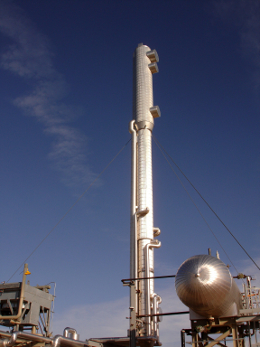
If there is one thing you can count on in the midstream, it is the search for the next hot play. The Barnett gave way to the Haynesville, which is giving way to the Marcellus. But before that play is even built up, we’re now hearing the rumbles of the next play: the Granite/Colony Wash.
No less a source than Chesapeake Energy Corp.’s Aubrey McClendon recently called the play, located in the Texas Panhandle and western Oklahoma, one of the core drivers of the company’s growth outside of its Big 4 shale plays: the Barnett, Haynesville, Fayetteville, and Marcellus.
It was only natural then that Chesapeake Midstream Partners, the company’s midstream spin-off that is 50% backed by Global Infrastructure Partners, would target the region for buildup.
“Our core mission is to connect and provide a high level of service to Chesapeake production gas. The Granite Wash is a great place to be right now in this gas price environment because it has a nice natural gas liquids (NGLs)/oil component,” said Bob Purgason, Chesapeake Midstream Partners’ chief operating officer.
The newly formed company focuses on two core areas: the Mid-Continent, which includes the Granite Wash, and the Barnett Shale.
The Granite Wash is a combination of new and old technology: it has characteristics of some of the shale plays, but also benefits from vertical drilling due to the technological advancements that shale plays helped create.
“It’s a unique animal. It’s not a shale; it’s distinct,” Purgason said.
“It is a very tight formation and you have to hit it with heavy stimulation like in the shale plays. Its IPs (initial production rates) and EURs (estimated ultimate recoveries) are making it more attractive than a lot of shale plays right now,” said Dave Presley, president and chief executive officer of Frontier Energy Services.

Pipeliners and midstream operators are building new take-away capacity for the growing production in the Granite Wash play.
Frontier Energy Services is the managing partner of Frontier Gas Services LLC, a joint venture of Tenaska Capital Management, Energy Spectrum, and Frontier Energy Services, that manages and operates midstream assets in the Mid-Continent, Permian Basin, East Texas, and Fayetteville Shale.
Presley said the company wasn’t attracted to this region because of the Granite Wash, rather the play came to life in a region the company was already operating in.
“We were attracted to the entire Panhandle area and we happened to be there as horizontal and advanced stimulation technology evolved. We’ve always liked the area and knew the formation was there, but it took technology to make the play what it is now,” he said.
That technology was developed in the unconventional natural gas and oil plays in the last few years and has been utilized in the Granite Wash, which has resources located at depths of over 12,000 ft.
The Granite Wash has also benefited from the presence of liquids, including oil production out of its wells. This has helped to provide the additional economic benefits that are making it attractive as the next big play in North America.
“The Granite Wash is very much a liquids play. Gas is nice, but it’s nicer when you have the liquids component to add to the economics for the producer,” Purgason said.
As producers begin to focus more on the Granite Wash, the need for midstream infrastructure continues to grow. The infrastructure needed the most is gathering pipelines and natural gas processing plants.
Both Presley and Purgason said that production is still in its early phases and it is too early to tell how large it could truly become. “I think it’s just being tapped as far as potential,” Presley said.
“My sense is that we’re early in the play. The producers are still learning as they’re drilling and completing these wells. There’s still a lot of innovation going on and the results do appear to be getting better, but there’s still a lot of unknowns out there. We’re hopeful that as they learn more and delineate the field that this is just the beginning of the play, but we’ll have to watch this next year and see how it develops,” Purgason added.
While Chesapeake Midstream Partners’ primary market is Chesapeake Energy production south of Clinton, Texas, the company has also begun to ramp up its offerings to third-party producers.
“At Chesapeake Midstream Partners, we are leveraging that footprint we have with Chesapeake drilling and beginning to attract third-party gas that is similarly situated and provide them the same high level of services that we try to give to Chesapeake production,” Purgason said.
These services include collecting flash gas gathering, as well as low- and mid-pressure gathering. Chesapeake Midstream also redelivers the gas for processing and as it moves to intrastate markets. “Our distinctive role is to really be producer-focused and provide them that highest level of service in terms of the multi-pressure levels,” he said.
Chesapeake Midstream’s gathering and transportation services are connected to both the Enogex and ONEOK systems. “We are working with whoever has the best flexibility in terms of markets and the best processing arrangements. We’re focused on getting producers’ gas to flow to the best combined market to get the highest netback,” he said.
Additionally, Chesapeake Energy and Enogex LLC are working together in the Colony Granite Wash play in Custer and Washita counties, Oklahoma.
To accommodate the expected production growth in the area, Enogex invested approximately US $55 million to build a combination of additional gathering and transportation pipeline infrastructure; a new gas-processing plant near Clinton, Oklahoma; and two new compressor stations. The plant, which was placed in service last October, can process up to 120 MMcfe/d of natural gas. Enogex says it is prepared for further growth to accommodate increasing Chesapeake production in the region.
A New Frontier
Frontier Energy moved into the play through the January acquisition of the Indian Creek gas-processing plant, and Presley said the play is the company’s primary processing focal point.
Producers are primarily worried about timely well connects, but because of the natural gas liquids content of the gas stream they are also looking for gathering and processing capacity in the play to expand from the current capacity represented by the play. Frontier’s 36 MMcf/d, state-of-the-art cryogenic plant is located in Roberts County, Texas, and is one of the newer plants in the region.
“We’re a fairly small player in the Granite Wash, but we’re in an area that hasn’t really been exploited and we’re starting to see a lot of activity. So we want to make sure we have the proper infrastructure in place that will result in a reliable and competitively priced service to our producers,” Presley said.
The company is looking to double its current throughput by the end of 2010 due to increased drilling in the region.
He noted that although drilling has slacked off this year due to the downturn in prices, the long-term processing capacity in the play is still a major issue. Additionally, there is a bottleneck for liquids transportation from the play into Mont Belvieu.
“There’s plenty of capacity at Conway, but at Mont Belvieu there’s some pipeline and frac bottlenecks. So one of the primary concern is how are you getting your liquids out of there if you’re a processor? What kind of capacities do you have at your current facilities?” he said.
Frontier’s liquids takeaway is through Enterprise Products Partners’ MAPL pipeline system and can be moved to either Conway or Mont Belvieu
Presley noted that Frontier has strong financial backing and no debt, so the company can grow its holdings in the play both through greenfield development as well as through acquisitions. “We are in an aggressive acquisition mode and the Granite Wash is a very strategic area for us. We’re looking to build a bigger footprint in the play,” he said.
The company is already in the midst of developing several expansion projects in the play. Frontier services in the play will include gathering, treating, processing, buying, and reselling natural gas and natural gas liquids with a focus on gathering and processing.
“We’re looking at a number of grassroots projects to expand our footprint in the play. We’re trying to grow it through expansions and/or acquisitions. We are working on two substantial expansions that will bring new gas supplies into our existing facility. We haven’t put a dollar limitation on spending in the play. We plan on spending a substantial amount of capital to grow our footprint in the Granite Wash,” he said.
Many Opportunities
Other companies focused on midstream activities in the Granite Wash include MarkWest Energy Partners, Eagle Rock Energy Partners, and Enbridge Energy Partners.
Last month, Frank Semple, MarkWest Energy Partners’ chairman, chief executive officer, and president, said the Granite Wash was the area “with the most compelling producer economics in the US.”
From the period of late 2008 to early 2009, MarkWest invested more than $100 million to upgrade its operations in the region to support the growth in the play. As of the third quarter 2009, MarkWest was gathering almost 100 MMcf/d out of the Granite Wash.

Frontier Energy Services' Indian Creek gas-processing facility is a cryogenic plant supplied by a low-pressure gathering system. The gathering system and processing plant are located in Roberts County, Texas, with production from the Granite Wash Formation. (Photo courtesy of Frontier Energy Services LLC)
The company owns the Foss Lake natural-gas-gathering system and the Arapaho I and II natural-gas-processing plants, all located in Roger Mills, Custer and Ellis counties of western Oklahoma. The gathering portion consists of a pipeline system that is connected to natural gas wells and associated compression facilities.
All of the gathered gas ultimately is compressed and delivered to the processing plant. MarkWest recently installed a 60-mile pipeline to serve the Granite Wash area of the Texas Panhandle. The new line connects assets acquired from Newfield Exploration to the company’s Arapaho processing plants.
Enbridge Energy Partners is another key midstream operator in the region. The company’s Anadarko System, located within the Anadarko Basin, is one of the key transportation facilities for the Granite Wash play. The system comprises approximately 1,800 miles of pipe and six active processing plants. Enbridge reports that it has increased the processing capacity on the Anadarko System to approximately 445 MMcf/d, and that it continues to add field compression to accommodate volume growth on this system.
Finally, Eagle Rock Energy Partners operates four gas-processing facilities with a combined inlet capacity of more than 100 MMcf/d, including the Arrington and Red Deer plants. The company also has about 900 miles of gathering lines in the play.
While it is still early in the game for the Granite Wash, the play is already gaining momentum in terms of both drilling and infrastructure, and the future promises to be bigger.
Recommended Reading
Exxon Slips After Flagging Weak 4Q Earnings on Refining Squeeze
2025-01-08 - Exxon Mobil shares fell nearly 2% in early trading on Jan. 8 after the top U.S. oil producer warned of a decline in refining profits in the fourth quarter and weak returns across its operations.
Phillips 66’s NGL Focus, Midstream Acquisitions Pay Off in 2024
2025-02-04 - Phillips 66 reported record volumes for 2024 as it advances a wellhead-to-market strategy within its midstream business.
Equinor Commences First Tranche of $5B Share Buyback
2025-02-07 - Equinor began the first tranche of a share repurchase of up to $5 billion.
Q&A: Petrie Partners Co-Founder Offers the Private Equity Perspective
2025-02-19 - Applying veteran wisdom to the oil and gas finance landscape, trends for 2025 begin to emerge.
Rising Phoenix Capital Launches $20MM Mineral Fund
2025-02-05 - Rising Phoenix Capital said the La Plata Peak Income Fund focuses on acquiring producing royalty interests that provide consistent cash flow without drilling risk.
Comments
Add new comment
This conversation is moderated according to Hart Energy community rules. Please read the rules before joining the discussion. If you’re experiencing any technical problems, please contact our customer care team.




